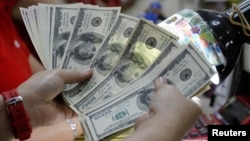WASHINGTON —
Economists are warning the government to take a cue from Japan’s decade-long fight to end deflation by implementing policies that deal with problems in purchasing local goods to ensure that the situation does not spiral out of control and cause further havoc to struggling ordinary Zimbabweans.
The latest figures released by the Zimbabwe National Statistics Agency (Zimstat) show that the country has entered its fourth month grappling with deflation.
Deflation occurs when the inflation rate falls below zero percent or a negative inflation rate is recorded. This has resulted in companies reducing the price of goods as people are failing to buy. Some firms have been forced to cut back production or close shop altogether.
The Confederation of Zimbabwe Industries says industrial capacity utilisation has fallen to about 30 percent.
Zimstat says latest figures show that the annual inflation for May was -0,19 percent, gaining -0,07 percentage points on the April rate of -0,26 percent as the drop in prices slowed down when compared to last year.
Harare-based independent economist, Best Doro, says the country’s failure to access capital injection is to blame for the deflationary pressures.
Former finance minister and leader of Mavambo Kusile Dawn party, Simba Makoni concurs concurs, adding that the problem is political.
Makoni says Zimbabweans must brace themselves for more economic problems.
But Resource Exploitation chief economist, Washington Mehlomakulu, says what is called deflation by some economists might be an economy in self-correction after prices had been too exaggerated.
But what can be done to address deflation that has forced some companies to close shop or to retrench workers?
Doro says it is going to be a tough act for Harare as it has no capacity to print money.
Director of the Labour and Development Research Institute, Godfrey Kanyenze, agrees, saying the government should, more importantly, quickly mend ties with the West.
All these economists agree that Zimbabwe will continue to experience deflation over the coming years. They urge Harare to carefully study Japan’s struggles with deflation saying lessons from the Asian country would greatly assist Zimbabwe as it goes forward.
Deflation hit Japan in the early 1990’s and it is still struggling with the after effects, more than two decades later.
The economists say Zimbabwe, saddled with a huge external debt, political instability and strained ties with the West, will in the meantime continue to struggle as the economy falters.
The latest figures released by the Zimbabwe National Statistics Agency (Zimstat) show that the country has entered its fourth month grappling with deflation.
Deflation occurs when the inflation rate falls below zero percent or a negative inflation rate is recorded. This has resulted in companies reducing the price of goods as people are failing to buy. Some firms have been forced to cut back production or close shop altogether.
The Confederation of Zimbabwe Industries says industrial capacity utilisation has fallen to about 30 percent.
Zimstat says latest figures show that the annual inflation for May was -0,19 percent, gaining -0,07 percentage points on the April rate of -0,26 percent as the drop in prices slowed down when compared to last year.
Harare-based independent economist, Best Doro, says the country’s failure to access capital injection is to blame for the deflationary pressures.
Former finance minister and leader of Mavambo Kusile Dawn party, Simba Makoni concurs concurs, adding that the problem is political.
Makoni says Zimbabweans must brace themselves for more economic problems.
But Resource Exploitation chief economist, Washington Mehlomakulu, says what is called deflation by some economists might be an economy in self-correction after prices had been too exaggerated.
But what can be done to address deflation that has forced some companies to close shop or to retrench workers?
Doro says it is going to be a tough act for Harare as it has no capacity to print money.
Director of the Labour and Development Research Institute, Godfrey Kanyenze, agrees, saying the government should, more importantly, quickly mend ties with the West.
All these economists agree that Zimbabwe will continue to experience deflation over the coming years. They urge Harare to carefully study Japan’s struggles with deflation saying lessons from the Asian country would greatly assist Zimbabwe as it goes forward.
Deflation hit Japan in the early 1990’s and it is still struggling with the after effects, more than two decades later.
The economists say Zimbabwe, saddled with a huge external debt, political instability and strained ties with the West, will in the meantime continue to struggle as the economy falters.




